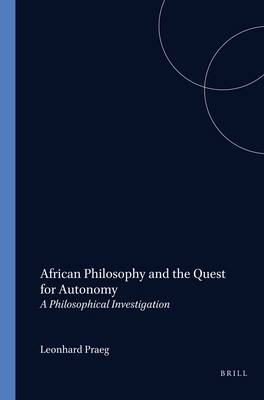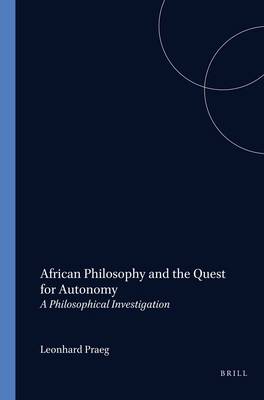
- Afhalen na 1 uur in een winkel met voorraad
- Gratis thuislevering in België vanaf € 30
- Ruim aanbod met 7 miljoen producten
- Afhalen na 1 uur in een winkel met voorraad
- Gratis thuislevering in België vanaf € 30
- Ruim aanbod met 7 miljoen producten
Zoeken
€ 167,95
+ 335 punten
Omschrijving
As academic subject African philosophy is predominantly concerned with epistemology. It aims at re-presenting a lost body of authentic African thought. This apparently austere a-historical concern is framed by a grand narrative of liberation that cannot but politicise the quest for epistemological autonomy. By "politicise" I mean that the desire to re-cover an authentic African epistemology in order to establish African philosophy as autonomous subject, ironically re-iterates Western, enlightenment notions of the autonomous subject. Here, in the pursuit of an autonomous subject the terms of historical oppression are necessarily duplicated in the terms of liberation. In this study I use the term disfigurement to refer to the double-bind - peculiar to post-coloniality - in which the African subject finds itself when it has to establish and affirm a sense of apartheid (in order to confirm the assumption of difference) by inventing its own autonomy in a way that ironically conflicts with an African conception of the autonomous subject. The transcendental concern with epistemological authenticity and autonomy - indicative of an oppressive desire for Western style autonomy - necessary as it may be in a post-colonial context, is placed in an ethical framework that seeks to remain faithful to the African dictum of identity and autonomy "I am because we are". Whereas the first three chapters are concerned with the transcendental question 'what is African philosophy?', the fourth and last chapter situates the ethical framework within which this question arises in the context of the recently "completed" South African Truth and Reconciliation Commission.
Specificaties
Betrokkenen
- Auteur(s):
- Uitgeverij:
Inhoud
- Aantal bladzijden:
- 356
- Taal:
- Engels
- Reeks:
- Reeksnummer:
- nr. 11
Eigenschappen
- Productcode (EAN):
- 9789042013636
- Verschijningsdatum:
- 1/01/2000
- Uitvoering:
- Paperback
- Formaat:
- Trade paperback (VS)
- Afmetingen:
- 150 mm x 220 mm
- Gewicht:
- 625 g

Alleen bij Standaard Boekhandel
+ 335 punten op je klantenkaart van Standaard Boekhandel
Beoordelingen
We publiceren alleen reviews die voldoen aan de voorwaarden voor reviews. Bekijk onze voorwaarden voor reviews.








